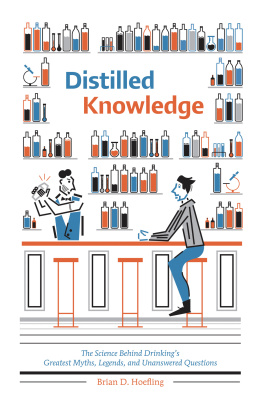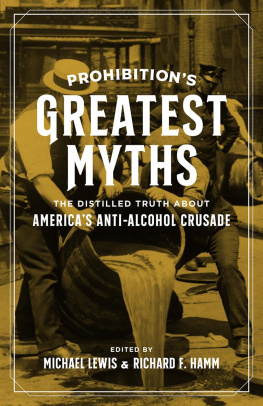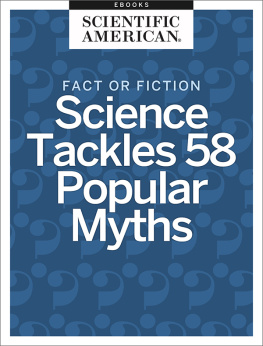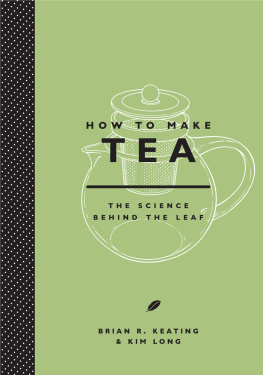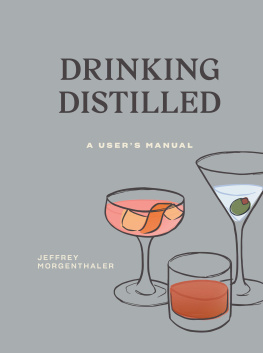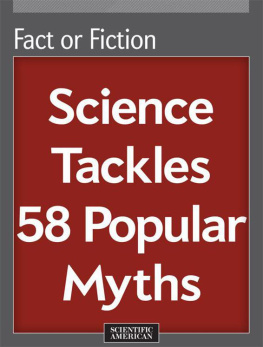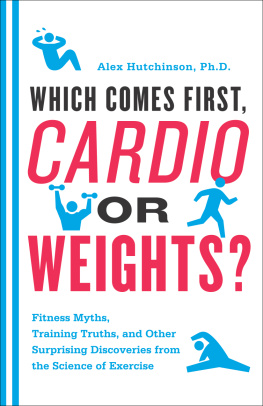Brian D. Hoefling
For my parents, whose pride and support I have never doubted, and who, having no idea what they were getting into, first taught me to drink.
| Preface |  |
Theres no shortage of scientific (or pseudoscientific) discussion about alcohol in our world. Pick up any bar guide or talk to any barfly, and eventually a theory of solution chemistry or human ethanol metabolism will be trotted out for your benefit. Sometimes these claims are even truethough it can be hard to tell which ones. Consider:
You should never add water to whiskey. ( False. )
Carbonated mixers get you drunker. ( True. )
A hangover is a dehydrated brain. ( Partially. ) ( Sometimes. ) ( A hangover is a lot of things. )
The maddening thing is, all the information you could want about drinking is out there. Scientists and industry professionals have done the research, but its hard to know where to look to get the answersparticularly if you have a lot of questions.
I know this from experience. Drinking has a remarkable ability to stimulate my academic interest (along with conversation and the desire to drink more). Ive been geeking out about cocktail recipes and booze history since college; it was only a matter of time before I started looking into the science.
Off and on, at odd hours over the course of several years, I tried to dig up information on alcohol facts Id never heard substantiated. Most of the time I was researching things that supposedly affect how drunk you getcarbonation, heat, the gold flakes in Goldschlger, and so on. It surprised me that there was no one-stop shop where I could get my questions answered.
That was the kernel that germinated into this book. It took a couple of years and a fortuitous conversation with a dear friend before Somebody should write a book about that finally turned into I should write a book about thatand so Distilled Knowledge was born. If it saves even one person a few hours of frustrated Googling, Ill be happy.
What Is This Book?
Distilled Knowledge is a compendium of basic scientific information that pertains to alcohol at all stagesfrom first fermentation to the last dregs of your hangover. I hope to answer common questions, put disputes to rest, and perhaps prompt some of you to further research on your own.
What Isnt This Book?
Oh, so many things. It isnt a work of original scientific scholarship. I am not a scientist; I come at this topic from the other sideIm a barfly, like you. What youre holding is my best understanding of the science thats already out there. If youre obsessive enough, you can find all this information yourself, by digging through library stacks and scouring the Internetbelieve me, I know. I wrote this book so you wont have to do all that.
It isnt a cocktail book or a guide to bar techniques. There are no recipes in these pages (not even as Easter eggs for those of you who assume Im being facetiousyou know who you are). If youre looking for recipes presented with a scientific flair, I recommend Dave Arnolds Liquid Intelligence or Kevin Lius Craft Cocktails at Home.
It also isnt the only book in the world that looks at alcohol from a scientific perspective. If youd like to read more on the topic but dont want to dive directly into the technical literature, Adam Rogerss Proof is an excellent next move. If youre one of those people who enjoys eating as well as drinking, Harold McGees magisterial On Food and Cooking is an invaluable reference to the whats and hows of both.
How Do I Use This Book?
Distilled Knowledge is structured so that it can be read straight through or consulted as a reference text. Each chapter is divided into sections that address particular topics. Where necessary, theyre cross-referenced with other sections or the Appendix for further readingjust follow the martini glasses. Bottoms up!
Ive tried to include at least a quick-and-dirty version of whatever background explanation you may need in each section. That way, if youre jumping around, you wont have to go back and read prior sections to understand what youre looking at; and if youre going straight through, youll know which of the things youve already learned will be specifically relevant to what youre reading. Youll also find a handy list of references in the back of this book, as well as footnotes that point you toward specific studies I mention.
Who Should Read This Book?
Everyone, naturally! My goal is for people at all levels of expertise to find something to appreciate. But Distilled Knowledge will probably be most helpful to the curious amateur, the person who knows just enough about science or alcohol to know that theres much more to learn.
Introduction
Everything You Need to Know about Alcohol, in about Twelve Hundred Words
If youre reading this book, youve probably had an adult beverage or two in your lifetime. Maybe youve even taken the time to read the labels on your bottles or to chat with your bartender. In other words, theres a pretty good chance you know the basics of what alcohol is, how its made, and so on. If you feel confident in your background knowledge, feel free to skip ahead to chapter 1.
If, however, you want to brush up on the fundamentals before moving on, this introduction should get you up to speed.
What Is Alcohol?
Chemically, an alcohol is an organic molecule that has a hydroxyl group (an oxygen atom connected to a hydrogen atom) attached to a saturated carbon atom:

Methanol: The simplest alcohol.
(You can forget that definition right away if you likewere not going to bother with it again.) In organic chemistry, you can tell which kind of chemical something is by its suffix; alcohols have names that end in -ol .
When we talk about alcohol in our daily lives, were pretty much always referring to ethanol, a structurally simple alcohol that makes us feel nice when we drink it:

Ethanol: The second-simplest alcohol.
Ethanol mixes with water in any proportionand since youre mostly water, it spreads throughout your entire body pretty quickly. Ethanol does some funny things to your body and your mind along the way, and its particularly mischievous in its dealings with your central nervous system. You know this as getting drunk.
Ethanol is naturally produced by a variety of microorganisms, most of which are yeasts. These microorganisms consume sugars and they produce, among other things, both ethanol and carbon dioxide. This process is one example of the broader suite of microbial activities that we call fermentation . Leavened bread, vinegar, and many other nonalcoholic products are made by different kinds of fermentation, but lets leave those aside for now.
Alcoholic beverages made by fermentation include wine (made from grapes), beer (made from cereal grains, especially barley), cider (made from apples), sake (made from rice), and mead (made from honey). Anything that contains sugar can be fermented under the right circumstancescarrots, milk, palm tree sap, you name it.

